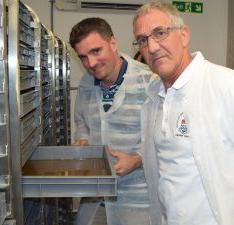GEORGE TOWN, Cayman Islands (CNS) — A group of local activists in the Cayman Islands, who are opposed to the planned release of genetically modified (GM) mosquitoes, have managed to delay the start of the project, which was due to get underway on Thursday.
The group aimed to highlight concerns about the failure properly to consult the public and the questions raised by the research into GM mosquitoes.
Dwene Ebanks, one of the leaders of the campaign, has confirmed that their application for a judicial review led to the courts putting a temporary stop on Thursday’s release until the legal challenge can be heard next week.
The local Mosquito Research and Control Unit has been working in partnership with the British-based bio-technology company, Oxitec, which created the genetically modified Aedes aegypti mosquitoes that are promoted as an environmentally friendly alternative to expensive and increasingly ineffective insecticides.
The company has engineered mosquitoes that are sterile. By releasing significant numbers of the male mosquitoes to breed with the wild females, scientists believe they can almost eradicate the disease-spreading invasive species.
The public health officials are increasingly concerned about the Aedes aegypti because the mosquito not only acts as a vector for diseases such as chikungunya, dengue and yellow fever, it also spreads the zika virus, which as a result of mutations has become a worldwide concern.
The GM insects have been released in a number of tests, including in Grand Cayman in 2010 as well as in Brazil and Florida. The FDA and the WHO have given the nod to the technology but there is still widespread concern about possible unintended consequences.
Ebanks, who is heading up the local opposition to the project, has said that the legal action is based on several areas of concern and the activists are thankful for the stay.
Oxitec had planned to release millions of mosquitoes during the pilot project scheduled to start on Thursday but the legal action will now be heard first. Ebanks and his supporters are arguing that there was a failure to carry out an independent risk assessment on which the local authorities could make an informed decision to grant the MRCU application to undertake this release.
In the application, Ebanks said the National Conservation Council relied solely on a risk assessment authored by Oxitec and supported by the MRCU from 2009 and failed to consider the fact that the risk assessment was not independent, since Oxitec has a commercial interest in the project. The activists also state that the risk assessment doesn’t comply with European law and that the NCC should have made enquiries to ensure it followed directives.
A major concern outlined in the judicial review application is that there was no proper public consultation before the decision was made and the NCC acted unlawfully when it granted the licence for the release. Ebanks also believes that the earlier trial in 2009/10 was done in secret and the whole project is putting the lives of local people at risk.
The activists still have some way to go to put a complete stop to the project but the MRCU confirmed that the release has been delayed and that they will release more information later.
The government is fully behind the project, however, as it believes it is a safe and inexpensive solution to a challenging public health problem if it is as effective as Oxitec claims. As a result, the government is expected to fight the judicial review, which is expected to be heard next week.














